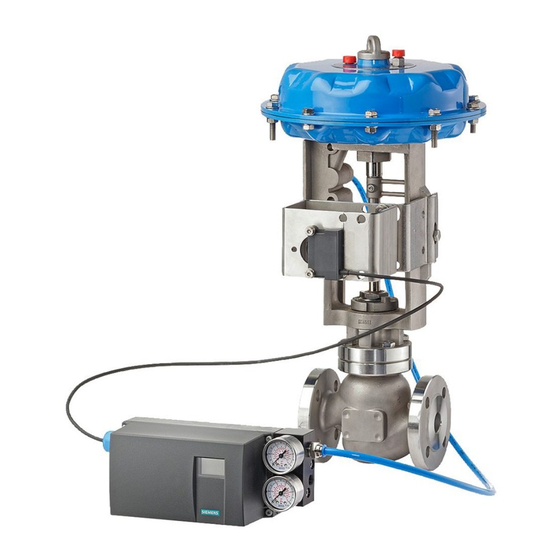Electropneumatic positioners
SIPART PS2
Technical description
Status monitoring with 3-stage alarm concept
The intelligent electropneumatic SIPART PS2 positioner is
equipped with additional monitoring functions. The status indi-
cations derived from these monitoring functions signal active
faults of the unit. The severity of these faults are graded using
"traffic light signaling", symbolized by a wrench in the colors
green, yellow and red (with SIMATIC PDM and Maintenance Sta-
tion):
• Need for maintenance (green wrench)
• Urgent need for maintenance (yellow wrench)
• Imminent danger of unit failure or general failure (red wrench)
This allows users to put early measures into action in the run-up
to a serious valve or actuator fault, which can prevent an immi-
nent system shutdown. The fact that a fault indication is sig-
naled, such as the onset of a diaphragm break in the actuator or
the progressive sluggishness of a unit, enables the user to en-
sure system reliability at any time by means of suitable mainte-
nance strategies.
This three-stage alarm hierarchy also allows early detection and
signaling of other faults, such as the static friction of a packing
box, the wearing of a valve plug/seating, or precipitations or in-
crustations on the fittings.
These fault indications can be output either line-conducted over
the alarm outputs (see above) of the positioner (max. 3), or via
communication over the HART or fieldbus interfaces. In this
case, the HART, PROFIBUS and FF versions of SIPART PS2 per-
mit a differentiation of the various fault indications, as well as a
trend representation and histogram function of all key process
variables with regard to the fittings.
The LCD of the device also displays the graded maintenance re-
6
quirements, complete with identification of the source of the fault.
Functional safety acc. to SIL 2
The SIPART PS2 positioners are also suitable for control of fit-
tings, which meet the special requirements of the functional
safety up to SIL 2 to IEC 61508 or IEC 61511-1.
This is a single-action, venting positioner with an input of 4 to
20 mA, PROFIBUS PA and FOUNDATION Fieldbus (FF) for
mounting on pneumatic actuators with spring return.
The positioner vents the valve actuator on demand or in the
event of a fault and puts the valve in the preset safety position.
This positioner meets the following requirements:
• Functional safety up to SIL 2 to IEC 61508 or IEC 61511-1,
from firmware version C4 or higher for safe venting
• Explosion protection for the versions 6DR5...-.E...
• Electromagnetic compatibility to EN 61326/A1, Appendix A.1
SIPART PS 2 as "intelligent solenoid valve"
Open / Close valves, safety fittings in particular, are generally
pneumatically controlled over a solenoid valve. If you use SI-
PART PS2 instead of this type of solenoid valve, the positioner
performs two tasks in a single device (without extra wiring)
• Firstly, it switches the fitting off on demand by venting the ac-
tuator (functional safety acc. to SIL 2 (see above)
• Secondly, it can perform a Partial Stroke Test at regular inter-
vals (1 - 365 days), which prevents the blocking of the fitting,
e.g. due to corrosion or furring.
As in this case SIPART PS2 is constantly working in normal op-
eration (e.g. 99 % position), it also acts as a permanent test func-
tion for the pneumatic output circuit, which is not usually possi-
ble when using a solenoid valve.
Solenoid valves on control valves can also not normally be
tested during operation. They are therefore not necessary when
using SIPART PS 2 with a 4-wire connection system as the vent-
ing is carried out on demand by SIPART PS2. This means that on
control valves, both the control function and the shut-off function
can be carried out by a single device.
6/6
Siemens FI 01 · 2009
© Siemens AG 2008
Configuring
The following settings, for example, can be configured in config-
uring mode as required with the SIPART PS2 positioner:
• Input current range 0 to 20 mA or 4 to 20 mA
• Rising or falling characteristic at the setpoint input
• Positioning speed limit (setpoint ramp)
• Split-range operation; adjustable start-of-scale and full-scale
values
• Response threshold (dead zone); self-adjusting or fixed
• Direction of action; rising or falling output pressure with rising
setpoint
• Limits (start-of-scale and full-scale values) of positioning
range
• Limits (alarms) of the final control element position; minimum
and maximum values
• Automatic "tight shut-off" (with adjustable response threshold)
• The travel can be corrected in accordance with the valve char-
acteristic.
• Function of binary inputs
• Function of alarm output etc.
The key aspects of configuring the different SIPART PS2 ver-
sions are largely identical.

